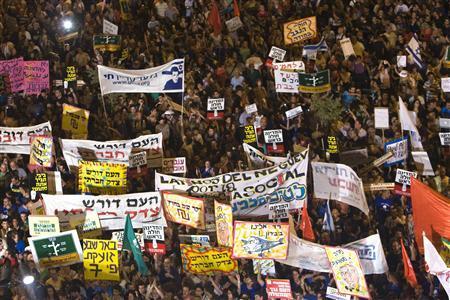An estimated 400,000 protested are crowding the city streets of Israel with fervent objections to their government’s priorities. These Israelis, who are taking over the streets of Tel Aviv, Jerusalem, Haifa, and other cities, are striving for social justice and a lower cost of living.
According to The New York Times, these protests commenced due to expensive housing but have since evolved to include demands for tax reform and an establishment of welfare. Whether or not the financial circumstances in Israel are bad enough for such a protest is arguable.
Max Carter, director of the Friends Center and campus ministry coordinator, questions the genuine necessity of these protests as the Israeli people clamor for lower prices. Carter, who has been to Israel between 15 and 20 times, spent two and a half weeks in Israel and the occupied territories this summer.
“They have a booming economy, so of course prices are going to go up; that’s one of the downsides of being prosperous,” said Carter. “Palestinians, however, are suffering. They’re under military occupation, they can’t travel, their kids don’t have a secure future. So part of me says, ‘Oh, give me a break. You’re earning 20 times per capita what Palestinians are, you’re living on Palestinian land … isn’t that a sign of privilege?'”
BBC News reports that, while other countries “look enviously at Israel’s growing economy,” those who live there do not feel so lucky. The protesters, who are mostly middle-class Israeli citizens, feel as though they are the ones that have to “bear a hefty tax burden.”
Ken Gilmore, associate professor of political science at Guilford, finds the Israeli protests to be a justified cause, but agrees with Carter about the stench of hypocrisy in the air.
“In the articles I’ve read, I haven’t seen people actually raising this issue about the Palestinian side or the Palestinian causes,” said Gilmore. “But people have a right to make a statement about what their society stands for. We have a right to go out into the streets and say, ‘Everyone should be able to afford a house. Everyone should be able to put food on the table.’ I think people need to be doing more of this stuff.”
According to The New York Times, this huge protest has been “carnival-like and nonviolent,” and, surprisingly, not even one display window has been broken. With such a large group of angry citizens, this is certainly a shock.
“It is admirable that 400,000 people protest and there is no violence, no shop windows broken,” said Carter. “But remember, these were all Israeli Jewish citizens. Yes, it’s a great example of peaceful protest and nonviolence, but compare that with how Israel deals with demonstrations by its Arab citizens in the occupied territories, and that’s a whole different ball game.”
Many people feel that how the Israeli government has responded to these protests proves that the government and its citizens are not seeing eye to eye. According to the Haaretz Newspaper, Israeli Prime Minister Benjamin Netanyahu has tried to quiet the protests, rather than respond to his citizens’ problems that are being addressed in these protests.
Junior Tim Leisman, who accompanied Carter on the trip to Israel and the occupied territories this summer, agrees that the government does not seem to be responding appropriately to the protests.
“It seems like the Israeli government’s priorities are off,” said Leisman. “To appease the protesters, Netanyahu said, ‘Well, we’re going to build more settlements.’ And the Israelis are thinking, ‘There are thousands of us with no homes and you’re proposing to build 400 more homes in Palestine. For what? That doesn’t benefit us at all.’ The government is focusing on building these settlements when actually the economic conditions in Israel are not ideal, and that’s what people are protesting about, but the government is not actually addressing these problems.”
Indeed there does seem to be a huge gap between the Israeli people and its government. At the core of these protests is the outrage over the government’s indifference to the citizens’ suffering, reported The New York Times.
Gilmore finds this to be a popular pattern found in countries all over the world today.
“The Israelis don’t like the policies of the government because they believe that these policies are controlled by people who don’t have their best interest at heart, which is really common,” said Gilmore. “People show up to topple the government in England, in Egypt, in Syria, in Yemen, it’s not just Israel. It’s happening in a lot of places.”
While government corruption and citizen unrest appears to be everywhere in the world, Gilmore raised the point that these massive protests aren’t present in the U.S.
“In the U.S., unemployment is extremely high, the government is paralyzed to doing anything about it, inequality in terms of wealth is higher than it has ever been, and yet, there’s nothing,” said Gilmore. “Why these protests in Israel and not here? Why is there not a revolution in this country? I don’t get it. Are we just happy to have a T.V. set so we can watch ‘Sports Center’ and ‘Jersey Shore’? These people are actually saying, ‘You know what, I’m pissed off.’ And in this country, we get nothing.”

